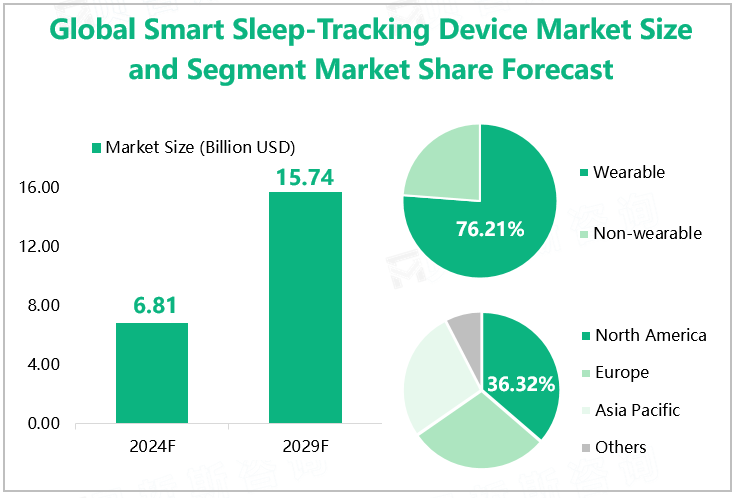Smart sleep-tracking devices are high-tech products that can monitor and record the user's sleep status in real-time. They can accurately capture user sleep data, including sleep time, deep sleep time, REM sleep time, wake-up frequency, etc., through built-in sensors and algorithms, providing users with personalized sleep analysis reports and improvement suggestions.
Overview of Market Development
With the advancement of technology and people's pursuit of a healthy lifestyle, the development prospects of the smart sleep-tracking device market are becoming increasingly broad. Meanwhile, with the application of technologies such as the Internet of Things and artificial intelligence, the accuracy and convenience of smart sleep-tracking devices have been further improved, meeting users' pursuit of high-quality life.
From the perspective of market demand, with the intensification of an aging population and the continuous increase of chronic disease patients, as well as the increasing attention of residents to sleep health issues, the demand for smart sleep-tracking devices is showing a continuous growth trend. Both the demand for medical sleep monitoring devices from medical institutions and the willingness of individual users to purchase home sleep monitoring devices are driving the rapid development of the market.
According to our research data, the global smart sleep-tracking device market size is estimated to reach $6.81 billion in 2024, an increase of 23.13% from 2023, and is expected to continue to increase to $15.74 billion by 2029.
Segmented Market Analysis
According to different usage methods and functional characteristics, smart sleep-tracking devices can usually be divided into two types: wearable smart sleep-tracking devices and non-wearable smart sleep-tracking devices. Wearable smart sleep-tracking devices are usually designed in the form of bracelets, watches, or chest straps, which are lightweight and portable, allowing users to wear them while sleeping. They evaluate the sleep quality of users by monitoring their physiological parameters such as movement, heart rate, and respiration. Non-wearable smart sleep-tracking devices mainly include smart mattresses, smart pillows, and sleep-monitoring devices placed next to the bed. They can comprehensively monitor the user's sleep environment and posture through built-in pressure sensors, temperature sensors, etc., providing more comprehensive sleep data. These devices are usually quite large and need to be fixed to the bed for use, but they can provide more accurate sleep monitoring results.
Research has shown that wearable smart sleep-tracking devices dominate the market among the two product types. Data shows that the global wearable smart sleep-tracking device segment market size is estimated to be $5.19intelli billion in 2024, with an expected market share of 76.21%.
From a regional perspective, the global market for smart sleep-tracking devices is dominated by three major regions: North America, Europe, and the Asia Pacific region. These three major regions account for over 90% of the global market share. Among them, North America is the largest revenue market. According to the data, the market size of smart sleep-tracking devices in North America is expected to reach $2.47 billion in 2024, with an estimated market share of 36.32%.
Global Smart Sleep-Tracking Device Market Size and Segment Market Share Forecast
Source: www.globalmarketmonitor.com
Analysis of Market Competition Pattern
From the perspective of market competition, the concentration of the global smart sleep-tracking device market is moderate, and many well-known brands have emerged in the market. Data shows that in 2023, the top 3 companies achieved a total revenue of $1.21 billion in the smart sleep-tracking device market, with a total revenue share of 45.20%. The top three companies were Fitbit, Inc, Samsung Electronics, and Xiaomi. In 2023, these three companies accounted for 17.97%, 13.82%, and 13.41% of the global market revenue in the smart sleep-tracking device market, respectively.
Smart Sleep-Tracking Device Market Revenue and Market Share of Main
Companies in 2023
|
Companies
|
Market Revenue (Million USD)
|
Market Share
|
|
Fitbit, Inc
|
481
|
17.97%
|
|
Samsung Electronics
|
370
|
13.82%
|
|
Xiaomi
|
359
|
13.41%
|
|
Top3 Companies
|
1210
|
45.20%
|
Source: www.globalmarketmonitor.com
Market Development Trend Prediction
From the perspective of market trends, the future smart sleep-tracking device market is expected to present the following development directions: firstly, the continuous enrichment of product functions, in addition to basic sleep monitoring, more functions such as heart rate monitoring and environmental monitoring will be added; The second is the further expansion of the market. With the increasing awareness of sleep health among consumers and the increasing demand for sleep monitoring equipment from healthcare institutions, the market size is expected to further expand; The third is the improvement of product quality and personalized demand. Consumer demand for high-quality and personalized products will drive the market to shift towards the high-end market.
